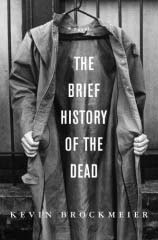
Reviewed by J. Edward Tremlett Imagine this: on the other side of death, there is a city. The city is made of small pieces of other cities from all around the world, all thrown together in some weird, patchwork quilt of architecture. When you die, you find your way to the city, and reside in it for as long as you, as an individual, are remembered by the living. And when the time comes that everyone who had direct contact with you is dead, you turn a corner and disappear... The city has stood since time began, but now it's beginning to unravel - right along with its inhabitants. For a terrible plague has broken loose across the world, and as people die in the thousands, and then millions, the dead are vanishing as well. And when the severity of the pandemic becomes clear to the city's inhabitants, they realize that this may be the end of things, and wonder what they should do. I'm sure that most fans of Wraith: the Oblivion are now salivating over that idea, and wanting to read more. I know I started to drool when I got my hands on an advance readers copy of The Brief History of The Dead, and marveled at the concept {and the cool cover}. But I'll save my fellow fans the disappointing time investment needed to read through Kevin Brockmeiers's latest novel. If you do, you'll most likely discover that, while it has an amazing central premise, and some pretty good spots, as a whole it flounders in the shallows of that one, good idea and never really gets out to sea. And that's a pity. Part of the problem is half of the narrative: after an amazing first chapter - which you can read here - we spend almost-equal time following the flailing progress of a woman marooned in the Antarctic, and slowly realizing what's happened to the outside world. While the dead are coming to grips with the enormity of their situation, and struggling with the philosophical problems it creates, Laura's fighting to rejoin any traces of humanity she can find there, or just stay alive. Yes, Laura's parents are there, in the city, relying on her endangered life to continue residence. But in spite of that connection, the two sides of the narrative never really hook up in such a way that they build synergy. Instead, after a few POV jumps in the city - and a profound lack of forward motion on anyone's part - I found myself more enthralled by Laura's doomed trek across Antarctica, and wondering if she could possibly make it, than I was about anything the dead were doing and saying. And by the time the drama kicked into high gear on both sides, the "dead" chapters were just that - dead boring by comparison. In the end, it really feels like two separate novels connected by the skein of pandemic. Laura's story would have actually been a fun read on its own, but it was weighed down by the increasing tedium of the city. And there, after a promising start that looks like we might get some action, the ghostly side of things spirals down into a complete lack of interest as people seem to accept their fate, rather than try to confront it. I often felt that the question "what happens to the city when we're gone?" seemed to take higher precedence than the emotions of its inhabitants, or anything they were doing. Wraithwise, there's some interesting stuff in this book. For example, when people die they have a surreal dream that always features the increasingly-loud sound of a beating human heart. And when the dream is over, they find themselves in the city, where they either create a new life for themselves, or try to pick up where they left off, maybe fixing things along the way. The city has echoes of Stygia about it - most notably the wild clash of styles and periods - and includes the tantalizing notion of its starting to shrink and fold in on itself as its inhabitants vanish, hundreds at a time... But those points of interest can't really make up for the drag of the narrative, or the horrible skew of its action. If the book had focused on the city alone, and added some sense - however false - of being able to do something about the plague, or the city, or both, this might have been a really good read. Likewise, if it had been all about Laura's attempt to survive, it might also have been pretty good. Putting these two tastes together did not create the desired effect, unless that was to make me wish I'd read something else, instead, and I have to give it two skulls out of five. Reviews on the Wraith Project are the opinions of those reviewers, and are not necessarily those of the Wraith Project themselves. If you disagree with this review, send in another one. If you still feel like strangling the reviewer, see an analyst. |
